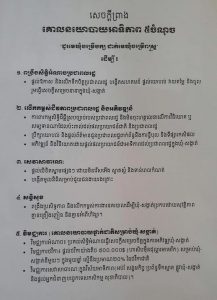តើអ្វីគឺការផ្លាស់ប្តូរនៅកម្ពុជា?
សូមពិនិត្យមើលអោយច្បាស់តាមរដ្ឋធម្មនុញ្ញមាត្រា១១៨និង១១៩ជាដើម។
What is change in Cambodia?
Please, look at Cambodia Constitution especially in chapter 118 & 119.

Article 118:
The Council of Ministers is the Royal Government of the Kingdom of Cambodia. The Council of Ministers shall be led by one Prime Minister assisted by Deputy Prime Ministers, and by Senior Ministers, Ministers and Secretaries of State as members.
Article 119:
Upon the request of the President and with the agreement of both Vice-Presidents of the National Assembly, the King shall designate a dignitary among the Members of the National Assembly of the party holding the largest number of seats in the National Assembly to form the Royal Government. This dignitary and Members of the National Assembly and members of political parties represented in the National Assembly who are proposed for positions within the Royal Government present themselves to the National Assembly to ask for a vote of confidence.
After the National Assembly passes a vote of confidence in the proposed Royal Government, the King shall issue a Royal decree appointing the entire Council of Ministers. Before taking office, the Council of Ministers shall take the Oath of Allegiance stipulated in Annex 6.

